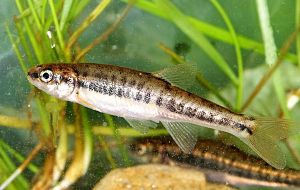MercoPress. South Atlantic News Agency
Researchers identify characteristics of fish most vulnerable to trawlers
 Dr. Killen said that “Selective harvest of animals by humans probably represents one of the strongest drivers of evolutionary change for wild animals.”
Dr. Killen said that “Selective harvest of animals by humans probably represents one of the strongest drivers of evolutionary change for wild animals.”  In lab-based experiments, the team carried out simulated trawl fishing on schools of wild minnows (Phoxinus phoxinus).
In lab-based experiments, the team carried out simulated trawl fishing on schools of wild minnows (Phoxinus phoxinus). Using laboratory-based experiments, researchers have identified the common characteristics of fish most vulnerable to being caught by trawlers. They found fish that were less able to produce fast burst-type swimming to evade capture were more likely to end up in trawlers' nets.
The data could help answer questions about fisheries-induced evolutionary change in fish populations, they added. The findings appear in the Proceedings of the Royal Society B Journal.
“What we were interested in, within a trawling scenario, was whether there was a variation among the fish in terms of how likely they were to be captured,” explained lead author Shaun Killen from the University of Glasgow.
“We looked at what role individual physiology played in determining which fish were captured and which ones were not.”
Writing in their paper, Dr. Killen and colleagues observed: “Selective harvest of animals by humans probably represents one of the strongest drivers of evolutionary change for wild animals.”
They added that previous studies had suggested that hunting and fishing could lead to genetic changes within wild populations.
In lab-based experiments, the team carried out simulated trawl fishing on schools of wild minnows (Phoxinus phoxinus).
“We did find that there was a lot of variation, and it was repeatable too - there were some fish that were consistently captured by trawling and there were some that were never captured,” Dr. Killen said.
The next question the team considered was whether this was related to any aspect of the physiology of the fish, such as their swimming performance or metabolic rate.
Dr. Killen revealed: “The fish that were most able to escape a simulated trawl where the ones where really good anaerobic athletes.
”If you think about Olympic athletes, sprinters will be the ones that have a really good anaerobic capacity whereas the long-distance runners will be more aerobic.
“We found that the ones that were capable of really fast bursts of movement were the ones most able to avoid capture.”
He explained that there was a growing body of evidence suggesting fish populations that had experienced a lot of fishing pressure seemed to be maturing earlier and smaller, adding “there is a big question as to whether or not that is an evolutionary effect of fishing pressure”.
The team used their study to measure the fishes' vulnerability to fishing gear.
“Think of the vulnerability as a trait of an individual animal,” Dr Killen added. “If all the fish were equal in terms of how likely they were to be captured then you would not have anything to worry about.”
Although the study focused on whether there was variability within the school of minnows when it came to vulnerability, Dr. Killen said it did raise questions about “fisheries-induced evolution”.
“Many other factors that need to be considered, but there is a reason why some fish were better swimmers than others. But what will the trade-off be?
”If you start selecting for fish to become better swimmers, they might need more energy just to live so their baseline metabolic rates might go up, they might grow slower or they might have a lower reproductive output - these are the things that we just don't know but there is bound to be some sort of trade-off.”




Top Comments
Disclaimer & comment rules-

-

Read all commentsAh! The University of Glasgow!
Aug 06th, 2015 - 05:38 pm 0Stating the blindingly obvious has always been a trademark of the head-bangers.
If they didn't do these studies and a few generations later the trawlers were not catching so may fish because the fish had evolved into fast burst fish, then we would be up the creek....it's not about stating the obvious...like slow fish get caught..it's about whether evolution will happen as trawlers are now the largest predator....
Aug 06th, 2015 - 06:00 pm 0Commenting for this story is now closed.
If you have a Facebook account, become a fan and comment on our Facebook Page!